As an American who grew up, in part, in Republican counties in key swing states (Pennsylvania and Florida), my Facebook newsfeed includes a lot of people from those voter battlegrounds.
In 2016, I was concerned at the outpouring of Trump support across my Facebook, but optimistically hoped the polls would be right. I’ve seen the same support throughout 2020, though some of it a bit quieter (glimpses of ‘likes’ or comments on other people’s posts, as opposed to outright posts of their own, but none switching sides). My hope this time was that increased turnout would swing in Biden’s favour, and, at the moment of writing, that is indeed a possibility.
Regardless of what happens, though, there is no question America is divided, and much to the surprise of many, particularly to those from outside the States, support for Trump is still strong. It is now clear that Trump is not – as many are describing him – an aberration, but a manifestation. But of what?
Undoubtedly there will be much research into what underlies all this in the coming days, weeks, months and years. There will probably be many correlations which we can only guess at for now – Evangelical Christians, for example, account for roughly a quarter of voters, and have been a reliable Republican contingent by and large for decades. The story of this election is still untold, but those voters often vote based on a firm anti-abortion stance, which remains a heavily contentious issue along party lines.
But there may well be another correlation that surfaces: education. Just before Election Day 2020, I watched a video about why the polls were so wrong in 2016. In it, they explain how pollsters weighted the responses, proportionally adjusting by age, gender, race, income and region, to ensure results were representative of the demographics of the population. What they neglected to account for, was education, which proved to be a key factor as less educated voters went for Trump. Some, but not all, pollsters have started to weight for education since.
I’ve been trying to figure out what we can learn from this for education in a world of fake news, racial inequities and the ‘Covid Generation’, through somewhat rose-tinted glasses shaded by a very particular ingrained American optimism and ambition for the ‘American Dream’.
In a post-Covid, post-Brexit, perhaps even post-Trump world, maybe we don’t need to learn anything so much as remind ourselves about something we already know – not to lower expectations for what students can achieve in life despite the uncertainty of the times, and instead ensure we are celebrating success and raising the bar for what they should believe they are capable of.
In his recent book, Humankind, Rutger Bregnan examines a well-known 1963 study in which teachers were told a scientist would be testing students’ capacity to progress throughout the school year. What they didn’t know was the test was nothing of the sort, the scores would be ignored, and instead ‘results’ would, by the toss of a coin, determine whether students were ‘high-potential’ or not. The students didn’t know anything about it. The teachers only knew who in their class they could expect to excel.
What happened next: the ‘high-potential’ students received greater amounts of attention, encouragement and praise, increasing those students’ self-belief. Unsurprisingly, those students excelled.
Bregnan goes on to explore whether this ‘Pygmalion Effect’ has upheld in the decades since, and indeed it has. As Bregnan explains, high expectations can be a powerful tool – in school, in the workplace, in the military, in hospital. Not only that, but the opposite holds true (the ‘Golem Effect’)– when there are low expectations for someone, they are overlooked, kept at a distance, even not smiled at as much. “When you’re subjected to low expectations, you won’t perform at your best, which further diminishes others’ expectations and thus further undermines your performance.”
In one dramatic experiment from 1939, half of a group of orphans were told they were articulate and the other half told they would be stutterers – an experiment that ended with lifelong speech impediments for some of those innocent children.
As education leaders, we can avoid imposing the Golem Effect on our students and assuming reasons they may fail are stronger than why they can succeed. Instead, we should value every single one of them and expect the very best for them. We should be equipping them with the knowledge and skills they will need to thrive in life, whatever path they take. We should be training them to think through the art of the possible and to know how to cope and adapt with whatever unexpected things come their way in life – for example, a global pandemic.
What we are seeing with the American election, is, when you think about it, a version of the Golem Effect. When you see the news over the last four-plus years, people have been told by Trump (and before that, by others) that the other side is after their jobs, their security, their rights; that there is a culture war, a caravan of immigrants coming to wreak havoc; that there is insurmountable division between ‘Red States’ and ‘Blue States’; that a leg up for someone else comes at their expense; that racism is over; and that the pandemic is not actually a thing.
Trump tells his base any issues that aren’t working in their favour, or that are causing them to feel marginalised, are because it can’t be helped when these ‘others’ are coming for them. Only Trump has the chutzpah to stand up to them, only he can Make America Great Again. This is disheartening, encourages isolation of ideology and is not at all helpful.
One trust CEO once told me that a red flag for the ability of a struggling school’s leadership to turn things around, is if you hear the headteacher respond to questions about improvement by saying something along the lines of, ‘but this is all we can expect from our families’ or even, ‘but our families don’t care about that’. I’ve witnessed this myself since.
Expectations are everything.
Shattered school leaders are on the frontline of the pandemic, reacting to last-minute guidance and working without a break trying to pull it all together for their school communities. So much seems out of our control, but we can look at what is within our circle of control.
We can respond to Trumpism, and indeed the steaming pile that is 2020, by opting for the Pygmalion Effect and having high expectations for what every student can achieve. We can expect them to thrive in whatever guise success would take for them, regardless of background or ability.
We can build their self-belief and we can encourage them to be critical thinkers so they can understand the world around them. We can even encourage them to see how their 2020 experiences will help to build their capacity to deal with change in life, to prepare for the unexpected, to adapt with no notice.
Those are coping skills that too many adults never develop over the course of their entire lifetime.
If this election has shown us anything, it’s that we can’t really change the minds of Trump voters with facts after they’ve already been told they’ll never thrive unless he saves them.
What we can focus on instead, is building the art of the possible and self-belief into the minds of children and young people who will be the voters of the future.





